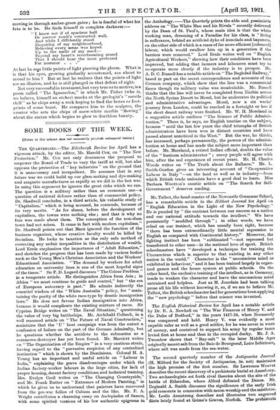SOME BOOKS OF THE WEEK.
[Notice in this column does not neuesarily preclude subsequent review.] THE QUARTERLIES.—The Edinburgh Review for April has a vigorous attack, by the editor, Mr. Harold Cox, on " The New Protection." Mr. Cox not only denounces the proposal to empower the Board of Trade to vary the tariff at will, but also opposes the protection of "key industries " on the ground that it is unnecessary and inexpedient. He assumes that in any future war we could build up our glass-making and dye-making and magneto manufactures as rapidly as we did in the last war. In using this argument he ignores the great risks which we ran. The question is a military rather than an economic one—a question of national defence rather than of commercial policy. Dr. Shadwell concludes, in a third article, his valuable study of " Capitalism," which is being accused, he contends, because of its very merits. "As for slums, before the development of capitalism, the towns were nothing else ; and that is why no fuss was made about them. The conception of the non-slum town had not arisen. It came in fact with modem capitalism." Dr. Shadwell points out. that Marx ignored the function of the business organizer, whose creative faculty would be killed by Socialism. He looks to taxation as the only safe method of correcting any unfair inequalities in the distribution of wealth. Lord Ernie emphasizes the importance of " Adult Education," and sketches the progress that has been made by various bodies such as the Young Men's Christian Association and the Workers' Educational Association. " The demand by workers for adult education on university lines is one of the most hopeful signs of the times." Sir F. D. Lugard discusses " The Colour Problem " in a temperate article. He distinguishes Africa from Asia ; in Africa " we must continue to guide and control," but " the era of European autocracy is past." He admits indirectly the essential wisdom of the " White Australia " policy, for " main- taining the purity of the white race-type by drastic immigration laws." He does not favour Indian immigration into Africa, because it would complicate the existing mixture of races. Sir Cyprian Bridge writes on " The Naval Situation," questioning the value of very big battleships. Mr. Archibald Colbeck, in a well reasoned article on " The Future of Naval Construction," maintains that the U ' boat campaign was from the outset a confession of failure on the part of the German Admiralty, but he questions whether the antidote to the submarine as a commerce-destroyer has yet been found. Mr. Marriott writes on " The Organization of the Empire " in a very cautious strain, having regard to the " pervasive suspicion of any centralized institution " which is shown by the Dominions. Colonel H. A. Young has an important and useful article on " Labour in India," explaining the grave disadvantages under which the Indian factory-worker labours in the large cities, for lack of proper housing, decent factory conditions, and technical training. Mrs. Evelyn Cecil writes on " The Changing Countryside," and Mr. Frank Rutter on " Extremes of Modern Painting," in which he gives us to understand that painters have recovered from the pre-war follies of Cubism and the like. Mr. F. A. Wright contributes a charming essay on Asclepiades of Samos, with some spirited versions of his few authentic epigrams in the Anthology.—The Quarterly prints the able and: pessimistie address on " The White Man and his Rivals " recently delivered by the Dean of St. Paul's, whose main idea is that the white working man, dreaming of a Paradise for his class, is living in sufferance, behind an artificial dyke of ironclads and bayonets, on the other side of which is a mass of far more efficient [coloured] labour, which would swallow him up in a generation if the barriers were removed." Lord Ernie writes well on " English Agricultural Workers," showing how their conditions have been improved, but adding that farmers and labourers must try to co-operate more closely if the industry is to. prosper. Mr. A. D. C. Russell has a notable article on " The Baghdad Railway," based in part on the secret correspondence and accounts of the Gorman company, which show that the line was a commercial fiasco though its military value was incalculable. Mr. Russell thinks that the line will never be completed from Nisibin across the North Syrian Desert to Mosul, but he underrates its political and administrative advantages. Mosul, now a six weeks' journey from London, could be reached in a fortnight or less if the short desert railway were finished. Mr. W. H. Moreland in a suggestive article outlines " The Science of Public Adminis- tration." There is, he says, no English treatise on the subject, because " until the last few years the chief triumphs of British administrators have been won in distant countries and have passed almost unnoticed in the West." But the war, he thinks, has increased, perhaps permanently, the powers of the adminis- tration at home and has made the subject more important than before. Mr. Moreland, a retired Indian official, doubts the value of the " business administrator " ; many people will agree with him, after the sad experience of recent years. Mr. H. Charles Woods writes on " The Truth about the Balkans." Mr. L. Smith-Gordon gives an interesting account of " Co-operative Labour in Italy "—on the land as well as in industry—from which British trade unionists have a good deal to learn. Miss Barbara Wootton's caustic article on " The Search for Self- Government " deserves reading.


































 Previous page
Previous page